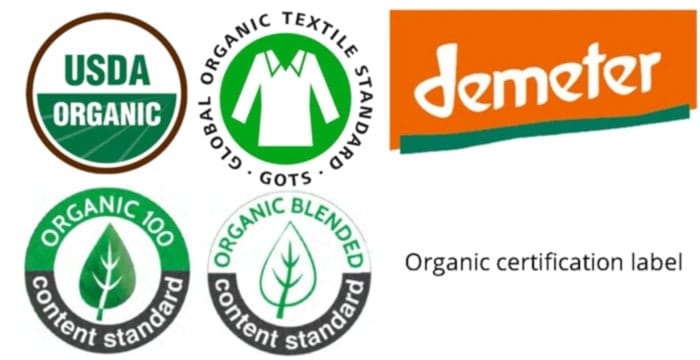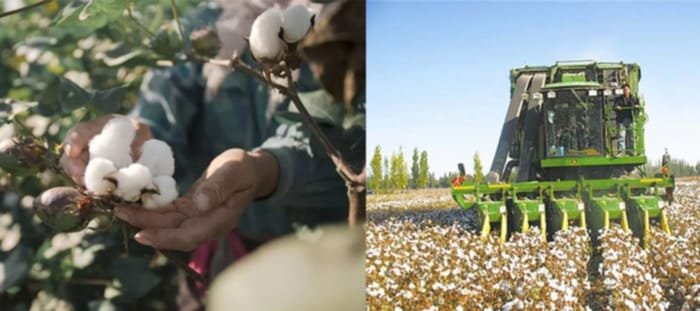Cotton has become an essential part of our lives. It may be the most commonly used material in the world.
From our shirts, pants and even our bags, everything has a little bit of cotton in it. In fact we can guarantee that you’re wearing something made of cotton at this moment.
However, did you know that there are two kinds of cotton, organic cotton and non-organic cotton.
What’s more is that there are some stark differences between the two when it comes to eco-friendliness, quality comparison, skin side effects etc.
So, if you are curious about the actual differences between the two and want to know our opinion on which is better, then stick around till the end of the article to find out.
How Is Cotton Made?
If you go into the depth of it there are just a few key differences in the creation of cotton and organic cotton. Like most other crops, it all starts from the seeds.
Cotton seeds are treated with fungicides, insecticides and pesticides which usually results in the seed being genetically modified.
The underlying thought behind using these chemicals is to protect the seed from insects and fungi. However, it results in the seed being genetically altered.
The final step that produces cotton through comes from the use of fertilizers in the soil and rarely rotating the soil.
This results in the formation of non-organic cotton and additionally causes a huge loss of natural soil.
How Is Organic Cotton Made?
The process through which organic cotton is created is quite similar to traditional cotton. There are only a few key differences in the process.
To put it simply, organic cotton is all of the cotton that hasn’t been genetically altered with chemicals.
But for those who want the details, when cotton is in the seed phase, no fungicide, insecticide or any other chemical is sprayed on it.
The crop is left to grow naturally then the end product is known as organic cotton.

The Key Difference Between Cotton and Organic Cotton
Eco Friendliness
The most major difference between the two types of cotton has to be the impact of both on the environment.
The fact that crops of non-organic cotton are sprayed with pesticides and insecticides instantly makes them harmful for the environment.
Conventional cotton uses almost 25 percent of the pesticides used in all of the farming carried out across the world.
These pesticides and fertilizers contaminate the water supply when they accumulate in rivers and lakes due to run off.
After this pollution of the water, that same water is absorbed by plants and ingested by all sorts of wildlife.
This finally results in the wildlife and plants dying off which in turn harms the food cycle which threatens biodiversity.
Organic cotton on the other hand does not harm the environment in any way shape or form and is eco-friendly in the truest sense because no chemicals were used in its creation.
Quality Comparison
There’s a big gap when it comes to quality between the two cotton as well. Conventional cotton gets treated with toxic and harsh chemicals to increase its longevity.
The fertilizers used to make the cotton crop grow quickly also have an adverse effect on the material in the long run.
Due to the use of these chemicals, cotton fibers lose their strength and are unable to retain their natural protective qualities.
This makes them lower in strength to organic cotton. Organic cotton doesn’t have to suffer from any chemicals hence it retains its natural strength and is used to make premium towels, bed linens and clothing.
Organic cotton also has the advantage of having longer fibres which means there’s fewer joins in spinning yarns. So if you want longevity in your clothes, we would suggest picking organic cotton.
Skin Side Effects
For a customer the most important advantage of organic cotton over conventional cotton is that it is softer and more comfortable.
For this exact reason, organic cotton items like towels, clothes and bags are preferred over conventional cotton.
The reason why organic cotton is much softer than conventional cotton is because it can retain its natural properties, which include softness, far longer than regular cotton.
What’s even better is that organic cotton is hypoallergenic which means people that have chemical sensitivities will have no problem using it.
It’s even the preferred option for people that have rashes or allergies.
Effects On The Lives Of Farmers
The world has recently seen a shift in trends and due to that people have been gravitating towards natural, organic and sustainable materials.
Wearing eco-friendly and cruelty free clothing is the new style which can prove to be very advantageous for cotton farmers.
We’ve already mentioned that about 25% of all the pesticide in the world is used in cotton farming.
Well, the use of these insecticides and pesticides is greatly harming the health of these conventional cotton farmers not to mention their families.
Farmers have also been generally mistreated by the traditional cotton industry while exposing them to toxic chemicals. Hence a shift to organic cotton will be a positive change for all.

Water Requirement
We’ll just make a simple comparison to make you understand the difference between organic cotton and conventional cotton when it comes to the water they require.
To grow 1 Kg of organic cotton you need a total of 1849 gallons or 7000 litres of water and 1 kg in clothes terms means a shirt and a pant.
However, in comparison to that, to grow 1 Kg of regular cotton the total water needed is 7660 gallons or 29000 litres!
Hence why, normal river flowing water cannot satiate the desires of conventional cotton and irrigation has to be used instead.
All this water is used to grow just 1 Kg which means growing conventional cotton in bulk is almost impossible without irrigation.
Organic Cotton vs. Traditional Cotton – The Final Verdict
After reading all the differences between cotton and organic cotton, you’ve probably come to the same conclusion as us. Organic and hand picked cotton is by far the better option over regular cotton or machine picked cotton.
Not only is it friendly for the environment but also in terms of resources, since the amount of water it requires is significantly lower than regular cotton.
All in all there are great benefits of using and farming organic cotton over cotton to all parties involved including the farmer and the consumer.


